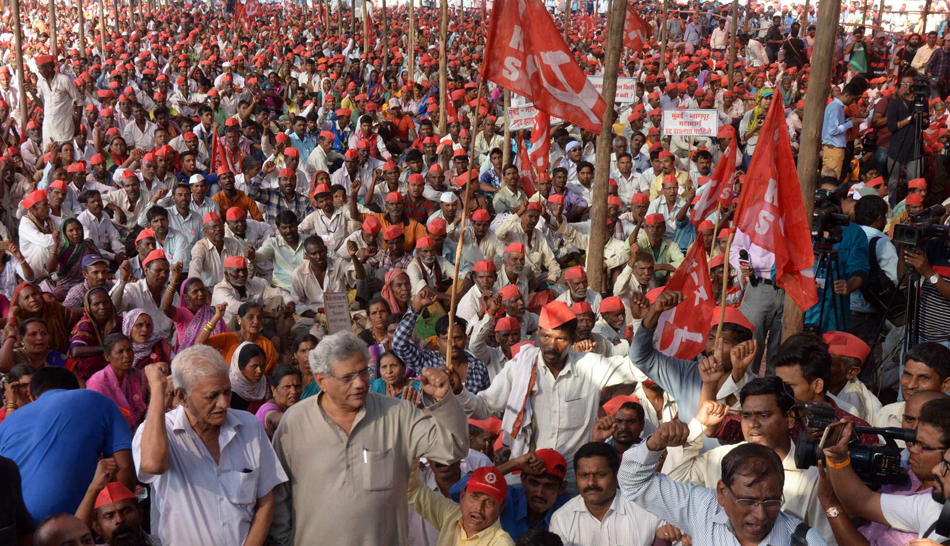
Farmers in the Indian state of Maharashtra are heading home after marching over 100 miles to press their demands on the state government in Mumbai. The 50,000 farmers who packed Mumbai’s Azad Maidan are forcing the state’s right-wing government to make good on its promises to help struggling farmers.
In India, as around the world, small farmers live on the edge of disaster. Heavily indebted, exposed to the erratic weather patterns of global climate change, and unable to break even in a market rigged toward huge, corporate production, farmers are taking their lives in staggering numbers.
Maharashtra, India’s second most populous state, has been especially hard hit, with more than 25,000 farmer suicides in the period from 2009-2016. The state’s right-wing government has decreed several rounds of reforms to address the crisis, but the benefits have failed to materialize. A farmers’ strike in Maharashtra last June won promises of state aid to farmers, but little has been forthcoming.
“This is a revolt against the betrayal of the peasantry by the BJP [Bharatiya Janata Party] government,” said Dr. Ashok Dhawale, president of the All India Kisan Sabha, or Peasants’ Union, which organized the march. The AIKS, affiliated with the Communist Party of India (Marxist), is one of the largest and most influential farmer’s organizations in India. Dhawale points out that the national government, also headed by the BJP under Prime Minister Narendra Modi, will have to intervene, rather than just passing the burden to the states.
Those demands include:
- full, rather than partial, loan waivers for farmers;
- implementing the 2006 Forest Rights Act, which recognizes forest-dwelling individuals and communities as having legal rights to the land they occupy;
- implementing the recommendations of the 2006 S. Swaminathan Commission Report, which aim at reducing inequality in land ownership, protecting farmers from predatory pricing, and guaranteeing farm families a stable livelihood.
Throughout the march, protesters showed a high level of organization and discipline, collecting and preparing food communally and even modifying their schedule to avoid disrupting students sitting for competitive exams. Upon the farmers’ arrival in Mumbai, dabbawalas (workers in the city’s homegrown food delivery service) gathered and delivered meals to them to show solidarity.
Monday afternoon, a 12-member delegation from the All India Kisan Sabha met with the government of Maharashtra—a meeting from which the farmers emerged victorious. “The government has agreed on 100 percent demands,” said Irrigation Minister Girish Mahajan.
The speed with which the right-wing government of Maharashtra “bends its knees”—as the CPI(M) put it in a jubilant Facebook post announcing the victory—demonstrates the strength of the farmers’ movement.
And Maharashtra is not the only front of struggle for farmers’ rights in India. Last month, farmers in the northwestern state of Rajasthan marched to Jaipur, blocking traffic on a major highway, to press their demand for loan waivers. And last year, also in Rajasthan, women in the village of Nindar sat neck-deep in pits for a month, protesting a land grab by the Jaipur Development Authority. Their protest forced the JDA to resurvey the land and modify the compensation offered to the farmers.
As Kavitha Kuruganti points out, debt relief for India’s farmers must come with other measures that protect them from falling back into debt. Ultimately, that means a break with the neoliberal policies that place farmers, workers, and even small businesses at the mercy of finance capital. That fight is on the horizon, and the farmers of Maharashtra will surely be on the front lines. But for now, they return home victorious.












Comments